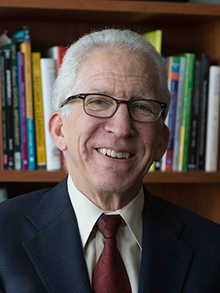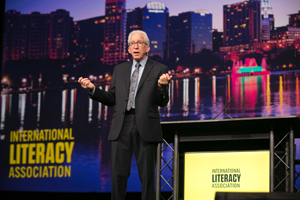 Today the literacy field is reeling from the loss of an influential educator, tireless advocate, and dear friend, Dr. William H. Teale.
Today the literacy field is reeling from the loss of an influential educator, tireless advocate, and dear friend, Dr. William H. Teale.
Teale, the Immediate Past President of the International Literacy Association (ILA), passed away unexpectedly Saturday, in his home in Evanston, IL. He is survived by his loving wife, Junko Yokota, and two children, Alyssa and Jeremy, among other family members and friends.
He was a professor of education, university scholar, and director of the University of Illinois at Chicago’s Center for Literacy (CFL), a public service and research center that works to improve literacy education, policy, and research at the local, state, and national levels. As part of his role at the CFL, he headed projects that provide economically underresourced families with services that facilitate their children’s early development and school readiness.
Teale’s body of work focused on early literacy learning, the intersection of technology and literacy education, and children’s literature. One current project centered on the implementation of a networked improvement community focused on principals' instructional leadership for literacy in eight Chicago public schools. He authored more than 150 professional publications and traveled constantly, presenting conference papers and colloquia in over 25 countries around the world.
He served as a consultant to school districts and libraries across the United States, as well as to Children’s Television Workshop, Head Start, public television, Reach Out and Read, and NGOs in developing programs focused on literacy learning and teaching. In review and advisory capacities, he worked for entities such as the National Academy of Education, the U.S. Department of Education, and the National Endowment for the Humanities.
The contributions he made to the field are immeasurable and led to his induction into the Reading Hall of Fame in 2003.
 During his tenure on the Board of Directors of ILA, including his 2016–17 term as president, Teale led several initiatives, including cochairing the ILA Global Task Force, a group that worked to emphasize a global agenda and matching model of governance in the organization. He was an integral member of the ILA/National Council of Teachers of English (NCTE) Task Force on Literacy Teacher Preparation. He also helped guide the organization during its transition from the International Reading Association to ILA.
During his tenure on the Board of Directors of ILA, including his 2016–17 term as president, Teale led several initiatives, including cochairing the ILA Global Task Force, a group that worked to emphasize a global agenda and matching model of governance in the organization. He was an integral member of the ILA/National Council of Teachers of English (NCTE) Task Force on Literacy Teacher Preparation. He also helped guide the organization during its transition from the International Reading Association to ILA.
Although his list of professional accomplishments and honors are plentiful enough to fill a book, the hole he leaves in the literacy community runs so much deeper.
Teale was incredibly passionate about early literacy and the importance of diverse, quality children’s literature, and he decried the inequities across the globe that denied access to both. He was the very definition of a literacy leader.
“These are trying times,” he said in his keynote address at the ILA 2017 Conference. “And there’s nothing more important than what we as educators do to help develop readers and writers who have the knowledge and the imagination and the self-reflection and the empathy to make the times better.”
He leaves behind a legacy as a staunch early literacy advocate, a devoted mentor, and an incredible human being.
Lara Deloza is the senior communications manager at the International Literacy Association.